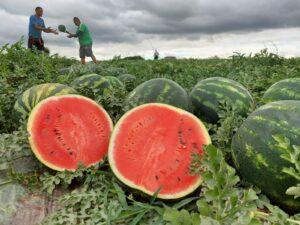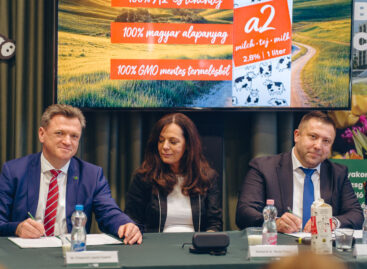We expect excellent Hungarian melons this year
The sale of Hungarian melons has started, domestic producers are expected to harvest 125-130 thousand tons of watermelons and 10-12 thousand tons of cantaloupe from the fields during the summer season. Based on the forecasts, the melon season promises to be good, which means that the delicious domestic fruit can sweeten the summer of many Hungarian families.

In Hungary, the average annual consumption is around 10 kg/person. In addition to domestic consumption of around 100,000 tons, around 20,000 to 25,000 tons can be exported, the largest part of which goes to the Polish, German, Czech and Slovak markets, explained Pál Lacházi, Syngenta’s melon specialist. “This is extremely important, as we can fully serve the domestic market with domestic goods. Experience shows that it is not possible to sell more melons in Hungary than at present. Fortunately, even before the start of the season, good news came from European countries regarding the export market demand. It can be expected that there will be a place to sell some of the Hungarian melons. On the part of the supermarket chains, there is an increasing demand for round watermelons weighing less than 10 kilograms, in addition to this, the proportion of seedless melons also shows an increasing trend year by year, both on the production side and in consumer demand. Watermelons of classic weight and shape, of high quality, with excellent content values, are in demand primarily in the traditional sales markets.
At the beginning of this season, the colder than usual period and less light made it difficult to produce seedlings
The lower temperature or the rainfall hindered the plantings in April and May, so in several cases the farmers had to schedule them later. Therefore, the early plantings have coincided and it is expected that the beginning of the harvest will also coincide with several varieties. The rains at the end of May and the beginning of July – local floods – and the associated cooling and cold dawns delayed the harvest. At the same time, they expect an adequate quantity and quality of harvest this year. The first crops from the early tunnel cultivation have already appeared on the Hungarian market these days. The expert said: in 2023, a total of 2,870 hectares of watermelons are expected to grow, which represents an increase of almost 10 percent compared to the previous year. About 125-130 thousand tons can be produced on this surface. The cantaloupe production area is around 315 hectares, on which 10,000 to 12,000 tons of produce can be expected during the season.
Approximately 75-80 percent of domestic watermelons are sold on the domestic market, the rest are exported
Melons are cultivated on 3.7-3.9 million hectares in the world. The largest producer in Europe is Spain, where the area under cultivation has decreased in recent years, so this year their area fell below 20,000 hectares. From such an area, 1.2-1.3 million tons of melons are harvested annually, of which almost 800,000 tons are exported, mainly to European countries. Italy, Greece and Turkey are important melon-growing countries in Europe. While excessive rainfall in Italy, drought in Spain is causing more and more serious problems for Greek and cantaloupe growers. Our country is located on the northern border of melon cultivation, our production area is small compared to the southern countries, but the standard of cultivation is high, and the quality and quantity of the produce are world-class. Hungary’s biggest competitors are Mediterranean Italy (their area increased by approx. 5%) and Greece, where the season can be longer thanks to the more favorable climate. The neighboring countries are struggling with similar weather and climate challenges, but Romania, Bulgaria and Serbia have also experienced significant development in cultivation technology in recent years, and these countries can easily become competitors in search of export opportunities.
At the same time, the significant and rapid increase in production costs is a serious headache for melons
The self-cost, which until now the farmers were forced to swallow, has been increasing for years. In the following years, it is inevitable that the cost increase will be enforced in some form in consumer prices, otherwise more and more melon growers may abandon their activities. But the price increase is not only a problem in this sector, as it can be observed and causes problems in almost all areas of agriculture. The cost of labor is rising rapidly, transportation is becoming more expensive, the price of energy is increasing, but the price of seeds and foil has also increased. Pál Lacházi emphasized that before the Hungarian watermelon cultivation, it would mean an opportunity, security and a reduction of risky cultivation if the harvest season were to be extended until the middle or end of September. Among the cantaloupes, the most popular and sought-after are the Cantalup and Gália types. The largest amount of cantaloupe is produced in the county of Bács-Kiskun. Cantaloupe still has great potential, there is a high demand for it, but the risk of production is also higher. The quality of the harvested and sold crops must always be impeccable, because even in the markets you can only survive in the long term with constant, reliable quality.
A well-known and cultivated variety from Syngenta’s commercial seed selection is the Mirsini F1, or as everyone calls it, the RUBIN variety
This is one of the varieties grown on the largest surface in our country. Its quality and content value stand out among similar varieties in the segment. The newest member, which is already popular among growers, is Mirto F1, which has a short breeding time and excellent quality. Its fruits are round in shape and have an extremely attractive dark striped skin color that is common on the market. The quality of the interior is also impeccable, and last but not least, it has an excellent yield. The seedless portfolio includes the 4-6 kilogram Bahama F1 and the 5-8 kilogram Morena F1. The round, black-skinned varieties are the perfect product for department stores and export markets.
Related news
Ministry of Agriculture: the government is supporting the development of crop dryers with significant resources
🎧 Hallgasd a cikket: Lejátszás Szünet Folytatás Leállítás Nyelv: Auto…
Read more >The guarantee of support for farmers is the preservation of an independent, autonomous agricultural policy
🎧 Hallgasd a cikket: Lejátszás Szünet Folytatás Leállítás Nyelv: Auto…
Read more >Related news
Tourism Business Index: improving sentiment, but the sector remains in the red
🎧 Hallgasd a cikket: Lejátszás Szünet Folytatás Leállítás Nyelv: Auto…
Read more >Levente Balogh announces a revolution in the quality dairy products market
🎧 Hallgasd a cikket: Lejátszás Szünet Folytatás Leállítás Nyelv: Auto…
Read more >Lamb Days – Gastronomic Adventure is coming again on March 28–29!
🎧 Hallgasd a cikket: Lejátszás Szünet Folytatás Leállítás Nyelv: Auto…
Read more >








